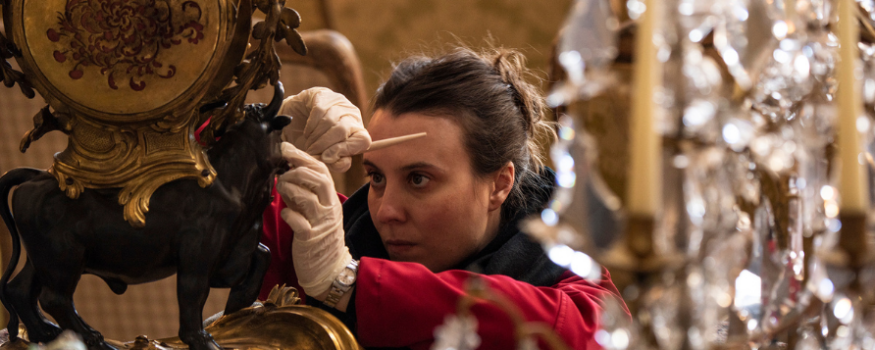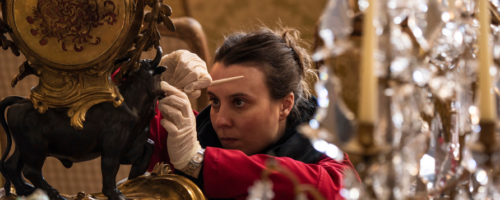Blenheim Palace’s annual deep clean is underway, in preparation for welcoming visitors.
The deep clean of Blenheim Palace includes everything from silverware and sculptures to tables and tapestries, including 18 clocks, 38 pieces of armour and 40 busts and sculptures. Each needs special attention and techniques for quality preservation, using distilled water and no aerosol sprays. The process will start in the Library on Sunday 7th January, which takes approximately 8 days, with the whole of Blenheim Palace taking 6-8 weeks in total to complete.
The UNESCO World Heritage Site is inviting visitors to learn about the vital work they carry out on the magnificent rooms and extensive collection of artifacts, with the opportunity to hear from experts on the methods used to restore and repair the building and collections within it. Restoration and conservation tours will run daily between Thursday 4 January to Thursday 16 February 2024.
Natural cleaning products, bristle brushes and old-fashioned elbow grease are being used by a team of cleaners as they embark on the annual New Year deep clean of Blenheim Palace. The team also adopt new technologies such as museum vacuum cleaners with HEPA filters, as each room has to be carefully stripped of all the furniture and artefacts and vacuumed from floor to ceiling.
Kate Ballenger, Keeper of Palace and Collections said, “Every year a whole team of specialists come together to undertake our vital deep clean. The process involves review, restoration, and thorough cleaning specific to each type of item, which is part of our continuous conservation work. Allowing visitors to see this first hand on a tour is incredibly exciting as it gives us the chance to show the immense effort that goes into preserving the past for future generations to enjoy.”
Alongside the annual clean, vital repairs and restoration are being undertaken in January to the Clock Tower. The Clock Tower connects the East Courtyard to the Great Court and the East Courtyard houses all of the services for the Palace. The clock, which has four faces and three bells, was made by Langley Bradley in 1710. Langley Bradley was Master of the Clockmakers Company and made the original clock (circa 1706) for St. Paul’s Cathedral in London.
The conservators will be completing the following significant repairs; gaining access to the dials using scaffolding and disconnecting all four dials from the clock, removing hands from all dials, inspecting the north dial hand and spindle ends, then withdrawing the dial motion works from all four dials. They will then remove the equipment and return the dial works and hand to Blenheim Palace’s workshop where the items will be fully stripped and cleaned. A new minute spindle for the west dial will be specially manufactured and once returned to the site, the dial motion works will be lubricated and installed as well as the hands. Finally, all four dials will be synchronized with the clock and hammer check springs will be adjusted.
Amongst these conservation and restoration projects, a ceiling survey in the Great Hall and Saloon is being done during January to gather an accurate assessment before a planned roof project.
The Restoration and Conservation tours are included with a Blenheim Palace ticket including Palace, Park and Gardens, Park and Gardens, Annual Pass or a Privilege Pass.
Click here for more information and to book tickets to visit Blenheim Palace.










